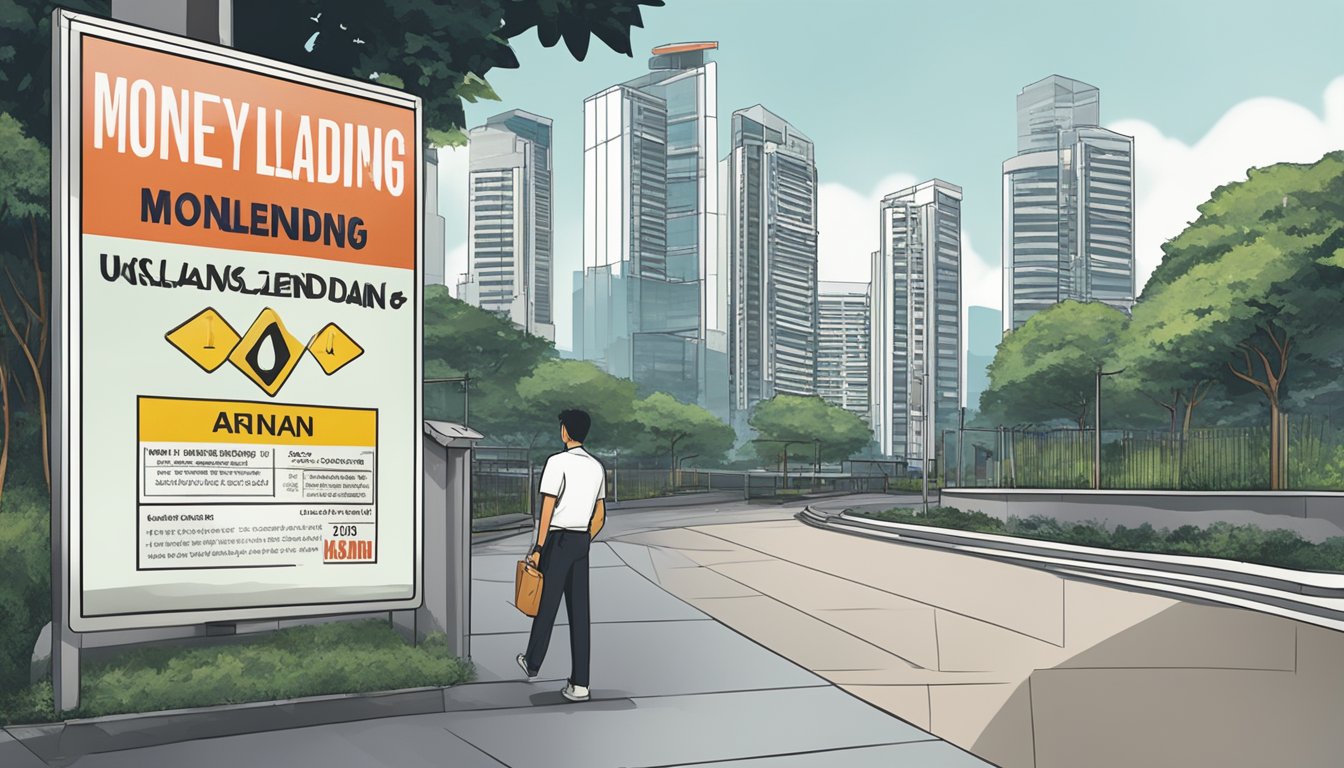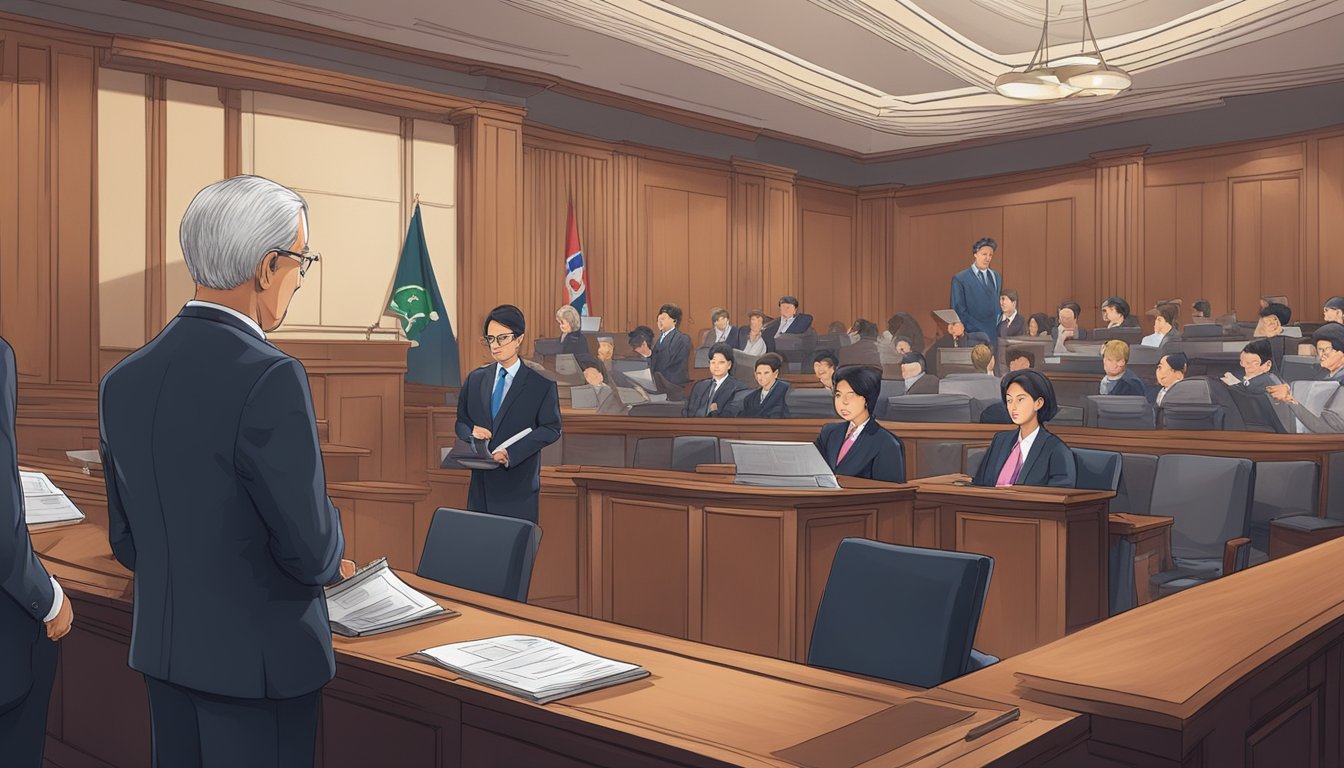If you’re in Singapore and in need of cash, you may be tempted to borrow from an illegal money lender. However, this is not a wise decision as borrowing from unlicensed moneylenders can lead to severe consequences. In this article, we will discuss the dangers of borrowing from illegal money lenders in Singapore and what you can do to protect yourself.

Identifying illegal money lenders can be difficult as they often operate under the radar. They may not have an office or website, and they may use aggressive tactics to collect payments. However, there are some red flags to watch out for, such as high interest rates, hidden fees, and requests for your SingPass login details. It’s important to be vigilant and do your research before borrowing money from anyone.
If you do borrow from an illegal money lender, you may face harassment, threats, and violence. You may also be trapped in a cycle of debt as the interest rates can be exorbitant. It’s essential to understand the risks and consequences of borrowing from unlicensed moneylenders before making any decisions. In the next section, we will discuss preventive measures you can take to avoid falling victim to illegal money lenders.
Key Takeaways
- Borrowing from illegal money lenders in Singapore can lead to severe consequences such as harassment, threats, and violence.
- Identifying illegal money lenders can be difficult, but you should watch out for red flags such as high interest rates and hidden fees.
- To protect yourself from unlicensed moneylending, you should do your research, avoid borrowing from unlicensed moneylenders, and seek legal and financial support if necessary.
Identifying Illegal Money Lenders

If you need to borrow money, it is important to know how to identify illegal money lenders, also known as loan sharks. These individuals or organizations operate outside the law and often use aggressive tactics to collect payments. In this section, we will discuss the warning signs of loan scams and the differences between licensed and unlicensed moneylenders.
Warning Signs of Loan Scams
Loan scams are a common tactic used by illegal money lenders. They often target vulnerable individuals who are in desperate need of cash. Here are some warning signs to look out for:
-
High-pressure sales tactics: If a lender is pressuring you to take out a loan, it is a red flag. Legitimate lenders will not try to rush you into making a decision.
-
No credit check: If a lender is not interested in your credit history, it is a sign that they are not concerned about your ability to repay the loan.
-
Upfront fees: If a lender asks for an upfront fee, such as a processing fee or admin fee, it is a warning sign. Legitimate lenders will deduct any fees from the loan amount.
Differences Between Licensed and Unlicensed Moneylenders
In Singapore, licensed moneylenders are regulated by the Ministry of Law. They are required to follow strict guidelines regarding interest rates and fees. Unlicensed moneylenders, on the other hand, operate outside the law and often charge exorbitant interest rates and fees.
Here are some differences between licensed and unlicensed moneylenders:
| Licensed Moneylenders | Unlicensed Moneylenders |
|---|---|
| Regulated by the Ministry of Law | Operate outside the law |
| Follow strict guidelines regarding interest rates and fees | Charge exorbitant interest rates and fees |
| Required to provide a contract outlining the terms of the loan | Often do not provide a contract |
| Required to deduct any fees from the loan amount | Often ask for upfront fees |
It is important to do your research and choose a licensed moneylender if you need to borrow money. This will help ensure that you are not taken advantage of by loan scams or unscrupulous lenders.
Remember, borrowing money is a serious decision that should not be taken lightly. Always read the terms and conditions carefully before signing any contract, and make sure you understand the interest rates and fees associated with the loan.
Consequences of Borrowing from Illegal Lenders

If you are considering borrowing money from an illegal money lender, also known as a loan shark, you should be aware of the serious consequences that come with it. Borrowing from an illegal lender can lead to harassment, violence, legal repercussions, and even imprisonment.
Harassment and Violence
Illegal lenders often resort to harassment and violence to collect their money. They may harass you at home, at work, or even in public places. They may also use threatening tactics such as sending you threatening messages, vandalising your property, or even physically assaulting you or your family members.
If you find yourself being harassed or threatened by an illegal lender, you should contact the police hotline immediately. The police take illegal lending very seriously and will investigate any reports of harassment or violence.
Legal Repercussions for Borrowers
Borrowing from an illegal money lender is a crime, and if you are caught, you could face legal repercussions. Under the Moneylenders Act, borrowers who borrow from unlicensed moneylenders can face imprisonment, caning, and fines of up to $300,000.
In addition to the legal consequences, borrowing from an illegal money lender can also have long-lasting effects on your credit score and financial future. It is always better to seek help from a licensed moneylender or a financial institution if you are in need of money.
In conclusion, borrowing from an illegal money lender can have serious consequences. It is important to be aware of the risks involved and to seek help from legitimate sources if you need financial assistance. Remember, borrowing from an illegal lender is never worth the risk.
Preventive Measures Against Unlicensed Moneylending

If you are concerned about falling victim to unlicensed moneylending in Singapore, there are several preventive measures you can take to protect yourself. This section will outline some of the most effective measures you can adopt to help reduce the problem.
Public Awareness Initiatives
One of the most effective ways to prevent unlicensed moneylending is to raise public awareness of the dangers associated with it. The National Crime Prevention Council (NCPC) has launched several initiatives to educate the public about the risks of borrowing from unlicensed moneylenders. These initiatives include the “X-Ah Long Hotline”, which allows members of the public to report unlicensed moneylending activities anonymously.
Secure Banking Practices
Another important measure you can take to protect yourself from unlicensed moneylending is to adopt secure banking practices. One of the most effective ways to do this is to ensure that you have a secure bank account. This means using internet banking tokens and SingPass to access your account, and ensuring that your account is protected by a strong password.
You should also be vigilant when it comes to your bank statements, and report any suspicious activity to your bank immediately. By adopting these measures, you can help to ensure that your finances are protected from unlicensed moneylenders.
Overall, it is important to be aware of the risks associated with unlicensed moneylending, and to take steps to protect yourself from this type of activity. By following the preventive measures outlined in this section, you can help to reduce the problem of unlicensed moneylending in Singapore and protect yourself from financial harm.
Legal and Financial Support for Victims

If you have fallen victim to illegal moneylenders in Singapore, there are government assistance programs and credit counselling services available to help you get back on your feet. Here are some options:
Government Assistance Programs
The Ministry of Law’s Registry of Moneylenders maintains a list of licensed moneylenders in Singapore. If you have been harassed or threatened by an unlicensed moneylender, you can report them to the Registry. The Registry will investigate the matter and take appropriate action.
ComCare is a government agency that provides financial assistance to low-income families and individuals. If you are struggling to repay a loan from an illegal moneylender, you may be eligible for assistance from ComCare. You can contact them at 1800-222-0000 or visit their website at www.msf.gov.sg/comcare.
Credit Counselling Services
Credit Counselling Singapore is a non-profit organisation that provides free debt counselling and advice to individuals and families in Singapore. They can help you create a budget, negotiate with your creditors, and develop a debt repayment plan. You can contact them at 6225-5227 or visit their website at www.ccs.org.sg.
The National Council on Problem Gambling provides counselling services to individuals and families affected by problem gambling. If you have borrowed money from an illegal moneylender to gamble, they can help you address your gambling addiction and develop a plan to repay your debts. You can contact them at 1800-6-668-668 or visit their website at www.ncpg.org.sg.
Remember, there is always help available if you have fallen victim to illegal moneylenders in Singapore. Don’t be afraid to reach out for assistance.
Regulatory Framework in Singapore

Moneylenders Act and Regulations
In Singapore, the Moneylenders Act is the primary legislation that governs money lending activities. The Act provides a regulatory framework for the licensing and conduct of licensed moneylenders, as well as the prevention of unlicensed moneylending activities.
Under the Moneylenders Act, licensed moneylenders are required to comply with strict regulations and guidelines. These include restrictions on the interest rates and fees that they can charge, as well as the maximum amount that they can lend. In addition, licensed moneylenders are required to adhere to the Code of Conduct for Licensed Moneylenders, which sets out the standards of behavior and professionalism that they must maintain.
To enforce the regulations set out in the Moneylenders Act, the Registry of Moneylenders was established. The Registry is responsible for issuing and renewing licenses for moneylenders, as well as monitoring their activities to ensure compliance with the law. The Registry also maintains a list of licensed moneylenders, which can be accessed by members of the public.
Role of Government Agencies
The Monetary Authority of Singapore (MAS) is the primary regulator of the financial sector in Singapore. While the MAS does not directly regulate moneylenders, it does play a role in ensuring that the financial sector operates in a safe and sound manner. This includes monitoring the activities of licensed moneylenders to ensure that they comply with the law.
In addition to the MAS, other government agencies also play a role in regulating the moneylending industry. Law enforcement agencies such as the Singapore Police Force and the Commercial Affairs Department are responsible for investigating and prosecuting cases of illegal moneylending activities. The Ministry of Law is also responsible for developing policies and regulations to ensure that the moneylending industry operates in a fair and transparent manner.
Overall, the regulatory framework in Singapore is designed to protect borrowers from unscrupulous moneylenders and to ensure that licensed moneylenders operate in a responsible and professional manner. By adhering to the regulations and guidelines set out in the Moneylenders Act, licensed moneylenders can provide a valuable service to borrowers who may not have access to traditional forms of credit.
Frequently Asked Questions

How can one identify an unauthorised money lending entity?
It can be difficult to identify an unauthorised money lending entity, also known as a loan shark, as they often operate under the radar. However, there are some red flags to look out for. Loan sharks usually offer quick cash loans without proper documentation or credit checks. They may also ask for personal information such as your SingPass login details or NRIC number. Additionally, they may use threatening or violent behaviour to collect debts.
What are the consequences of borrowing from an unlicensed lender?
Borrowing from an unlicensed lender can have serious consequences. Loan sharks often charge exorbitant interest rates, which can make it difficult to repay the loan. They may also use harassment, intimidation, or violence to collect debts. This can lead to emotional distress and even physical harm. Additionally, borrowing from an unlicensed lender can damage your credit score and make it harder to obtain loans in the future.
Where can victims of loan shark harassment seek help?
If you are a victim of loan shark harassment, you can seek help from the National Crime Prevention Council (NCPC) or the Singapore Police Force (SPF). The NCPC provides support and advice to victims of loan shark harassment, while the SPF investigates and prosecutes loan shark activities. You can also seek help from the Credit Counselling Singapore (CCS), which provides debt management and financial counselling services.
What steps has the Singaporean government taken to curb illegal lending?
The Singaporean government has taken several steps to curb illegal lending. The Moneylenders Act was enacted to regulate the money lending industry and protect borrowers from loan sharks. The government has also introduced measures to increase public awareness of loan shark activities and encourage victims to come forward. Additionally, the police have stepped up enforcement efforts and have made several high-profile arrests of loan sharks in recent years.
How can individuals report suspected illegal lending activities?
If you suspect illegal lending activities, you can report them to the police or the NCPC. You can also call the X-Ah Long hotline at 1800-924-5664 to report loan shark activities anonymously. It is important to report suspected loan shark activities to help prevent others from falling victim to these unscrupulous lenders.
What legal protections exist for those affected by unlicensed money lending?
There are legal protections in place for those affected by unlicensed money lending. The Moneylenders Act provides for harsh penalties for loan sharks, including fines and imprisonment. Victims of loan shark harassment can also seek a Protection Order from the court, which prohibits the loan shark from contacting them or their family members. Additionally, victims of loan shark harassment can seek compensation from the loan shark for any losses or damages suffered.




